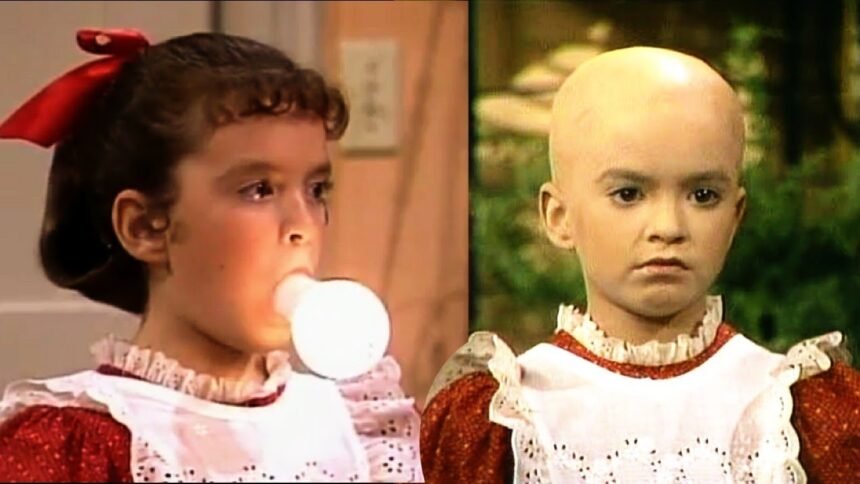The 1980s marked a golden age for quirky family sitcoms, but few shows captured the strangeness and wonder of that era quite like Small Wonder. At the heart of this unlikely science fiction classic was its most unforgettable character: Vicki the robot. Known variously as Vicki small wonder, small wonder Vicki, or V.I.C.I. (Voice Input Child Identicant), this android girl would become a cultural phenomenon and a key part of many childhood memories.
The Origins of Small Wonder and Vicki
Small Wonder first aired in September 1985, introducing television audiences to the Lawson family and their extraordinary “daughter,” Vicki the robot small wonder. Created by engineer Ted Lawson for United Robotronics, Vicki’s original purpose was to assist handicapped children, but her design was so lifelike that Lawson brought her home to live as part of his family. The plot revolved around the Lawsons’ attempts to keep their robot daughter’s true nature hidden from nosy neighbors and the outside world.
Vicki’s human-like appearance and robotic monotone voice (deliberately portrayed by actress Tiffany Brissette) gave the show its signature blend of humor and surrealism. The sitcom quickly developed a cult following, especially among young viewers, and spawned international syndication and decades of nostalgia.
Meet Vicki: Features and Abilities
Vicki small wonder was no ordinary member of the Lawson household. Designed to resemble a 10-year-old girl, she was equipped with a host of unusual abilities that made her simultaneously endearing and unsettling. Sporting real hair, realistic skin, and advanced electronics under the surface, Vicki’s features included superhuman strength, speed, and a variety of built-in technological gadgets.
These included:
-
An AC outlet under her right arm
-
A data port under her left arm
-
An access panel on her back
Throughout the show, small wonder Vicki would regularly demonstrate abilities like lifting massive weights, computing complicated math instantly, and even channeling electricity through her hands to jumpstart a car or a person’s heart. Sometimes her powers would stretch the bounds of believability, with one-off episodes showing her shrinking to doll size, growing to ten feet tall, or elongating her neck like a mechanical Inspector Gadget. Each week’s plot seemed to invent a new use for her unique skills, which only added to the unpredictability that made the show so memorable.
The Lawson Family’s Double Life
Central to Small Wonder’s humor was the Lawsons’ attempt to conceal Vicki’s robotic identity from their neighbors, the Brindles, and the outside world. To anyone who asked, Vicki was introduced as an orphaned family member who had been legally adopted. The Lawsons had to explain away Vicki’s emotionless voice, habit of standing in the closet when powered down, and her astonishing physical feats.
The Brindles—especially Harriet, the Lawsons’ neighbor’s daughter—were constantly snooping for secrets. Their nosiness fueled many classic sitcom misunderstandings, close calls, and comedic moments, all while making Vicki’s ability to blend in even more crucial.
Why Vicki the Robot Small Wonder Became a Pop Culture Icon
Several factors contributed to the enduring legacy of Vicki small wonder. First, her unique character design—a young girl who was also a literal machine—stood out in a TV landscape crowded with talking animals and magical family members. Vicki’s flawless, emotionless delivery and robotic mannerisms (like speaking in monotone, never blinking, and moving stiffly) set her apart from even the most unusual sitcom characters.
Second, the show’s willingness to use Vicki as a metaphor for outsider status resonated with many young viewers. She struggled to understand humor, emotion, and social cues, reflecting in many ways the difficulties of navigating childhood. Fans loved seeing someone “different” not only accepted but embraced by her family and friends—even if she wasn’t technically human.
Behind the Scenes: The Actress Who Played Vicki
Portraying Vicki required remarkable discipline and talent from Tiffany Brissette, the young actress charged with the role. Performing with minimal facial expression and nearly robotic timing, Brissette brought vulnerability and depth to an otherwise intentionally “flat” character. The challenge of aging in real life while playing a perpetual child robot was dealt with on-screen by upgrades: in later seasons, Vicki’s appearance was updated and she was allowed to eat, drink, and wear more modern clothes, cleverly explaining the changes in Brissette’s real-life growth.
Small Wonder’s International Popularity and Criticism
Although many TV critics lambasted the series for its campy special effects and simplistic plots, audiences—especially kids—loved its weirdness and heart. Small Wonder was sold to more than 20 countries and was widely popular in places like India (where it aired in English, Hindi, and Tamil), Brazil (under the name “Superviki”), France, and the Philippines. The show eventually aired during Ramadan in Saudi Arabia and became a cult classic among Gen X and Millennial viewers.
Small Wonder Vicki has also become one of television’s go-to references for robot girl parodies, spoofed over the years on animated series like Family Guy and Robot Chicken. Despite negative press—in some lists called the “worst sitcom of all time”—its enduring appeal truly testifies to the character’s impact and to Vicki’s ability to capture the imagination.
Vicki’s Place in Sci-Fi History
Vicki the robot small wonder paved the way for future explorations of artificial intelligence, robotics, and human-computer interaction on television. Before Amazon’s Alexa or the rise of realistic AI in daily life, Vicki was already grappling with what it meant to be “almost human,” struggling with the rules of everyday life, language, and morality. The show’s blend of comedy, science fiction, and social commentary made it a surprising predecessor to today’s fascination with AI and androids.
The show’s creator, Howard Leeds, was no stranger to using robots as characters—he’d previously worked on My Living Doll, another sitcom about an android. But it was with Small Wonder that the concept found mainstream resonance, largely because of the relatable trials and comedic confusions built into Vicki’s childlike personality.
Where Are the Cast and Vicki Today?
Since the series ended, fans have repeatedly speculated on the whereabouts of Tiffany Brissette (who played Vicki small wonder) and the rest of the cast. Brissette largely retired from acting and is reported to be working in the medical field today, far from TV spotlights. Rumors of reunions and reboots have circulated but nothing concrete has developed.
Small Wonder lives on in streaming reruns and the hearts of those who grew up with Vicki, making the robot girl one of TV’s most memorable child stars.
Learn More (High-Authority Reference)
To dive deeper into the world of iconic TV robots and the legacy of Vicki the robot small wonder, explore the Smithsonian Magazine’s coverage of classic androids and AI in pop culture: Smithsonian Magazine on Pop Culture Robots.
Read More: Love’s Express Login: Step-by-Step Guide to Access Your Account
Final Thoughts
Vicki the robot from Small Wonder endures because she was both outlandish and profoundly relatable—a child navigating the world with an outsider’s perspective, built on the threshold between human complexity and robotic logic. For those who remember tuning in every week, she’ll always be more than machine: she’s small wonder Vicki, a pop culture legend guaranteed to spark nostalgia and fascination for decades to come.









